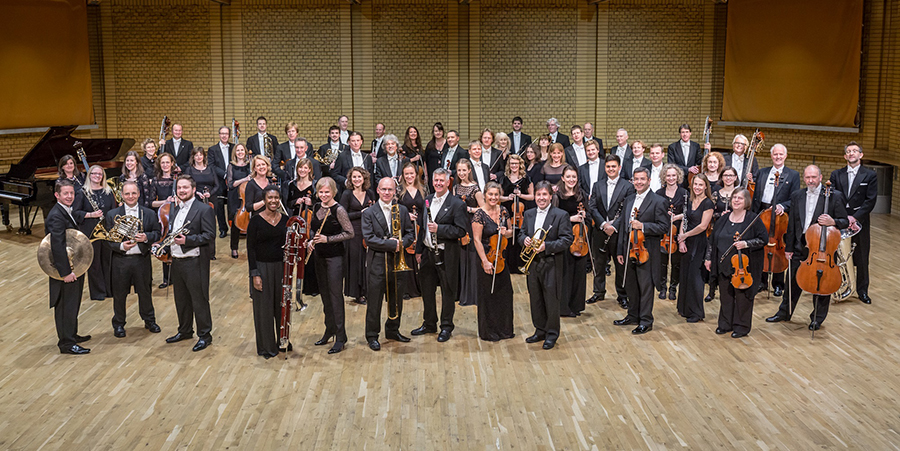This month, the San Francisco Symphony presents the first in its 2022-23 Great Performers concerts, in which world-class artists and visiting orchestras appear at Davies Symphony Hall throughout the current season.
Included in this series of performers are pianists Leif Ove Andsnes, Jean-Yves Thibaudet and Daniil Trifonov; violinists Joshua Bell, Hilary Hahn and Itzhak Perlman; the City of Birmingham Symphony, led by Mirga Gražinytė-Tyla, and the Israel Philharmonic, under the direction of Lahav Shani. Pianist Igor Levit appears in recital as part of his artist residency at the Symphony, and Yuja Wang appears with the Symphony and Esa-Pekka Salonen in advance of the Orchestra’s European tour next March.
The first concert in this series takes place on October 16, when the City of Birmingham Symphony Orchestra, under Mirga Gražinytė-Tyla, makes its debut at Davies Symphony Hall. The program of mainly British music includes Britten’s Four Sea Interludes from his opera, Peter Grimes, Thomas Adès’ Exterminating Angel Symphony, Debussy’s La Mer and the Cello Concerto by Sir Edward Elgar.
Mirga Gražinytė-Tyla is for this season principal guest conductor at the City of Birmingham Symphony Orchestra, having held the role of Music Director there since 2016. She was a Dudamel Fellow with the LA Philharmonic during the 2012-13 season, then became Assistant Conductor and subsequently Associate Conductor of the orchestra. She was also the Music Director of the Salzburg Landestheater for two years.
Recent highlights of Maestra Gražinytė-Tyla’s career include a highly acclaimed performance of Britten’s War Requiem at the Salzburger Festspiele, her return to opera with a new production of Janáček’s The Cunning Little Vixen at the Bayerische Staatsoper, a number of European tours with the CBSO and performances with the London Symphony Orchestra, the NDR Elbphilharmonie, the Swedish Radio Orchestra, Filarmonica della Scala and the Los Angeles Philharmonic.
The soloist in this performance of the Elgar Cello Concerto is the remarkably talented, internationally renowned, young British cellist, Sheku Kanneh-Mason MBE, winner of the 2016 BBC Young Musician competition, and the first cellist in history to reach the UK Top 10, which he achieved with his album, Elgar, in 2020. Kanneh-Mason has twice performed at the BAFTA awards ceremony, twice won recognition as the Best Classical Artist at the Global Awards (the second award as part of the Kanneh-Mason family) and has won the 2020 Royal Philharmonic Society’s Young Artists’ Award.
The Elgar Cello Concerto is probably among the composers best-known works. Written in 1919, in the aftermath of World War I, it was his last composition of any note. Elgar was horrified by the deprivation and suffering which resulted from the war, and he knew that life would never again be the same. He wrote little during the war years, but from August 1918, he composed four pieces, three chamber works and the Cello Concerto, which became a lament for a lifestyle which would never return. It was premiered by the London Symphony Orchestra on October 27, with the composer conducting, and although it was poorly received at the time, the concerto achieved international recognition some years later when British cellist Jacqueline du Pré recorded it in the 1960s. Since then – together with the Dvořák Cello Concerto – it has come to be regarded as one of the cornerstones of the solo cello repertoire.
The program opens with the Four Sea Interludes from Benjamin Britten’s opera Peter Grimes – Dawn, Sunday Morning, Moonlight and Storm – the different movements depicting the changing moods of the sea. Based on part of a poem, entitled The Borough, by Suffolk writer George Crabbe, the opera tells the tragic tale of a seafarer, Peter Grimes, who is misunderstood by the hypocritical local villagers, and ultimately lost at sea.
Thomas Adès’ Exterminating Angel Symphony is an orchestral rendering of music from his third opera of that name, based on the 1962 surrealist film El ángel exterminador by Luis Buñuel, which tells of a group of society friends relaxing after a post-opera dinner who find themselves – inexplicably – unable to leave because of a silent barrier at the edge of the room. The Symphony was written in 2020, premiered by the BSO with Mirga Gražinytė-Tyla at Symphony Hall in Birmingham on August 4, 2021, and was performed at the BBC Proms on August 5, 2021. It has four movements – Entrances, a March, a Berceuse and Waltzes.
Claude Debussy is often regarded as a “musical Impressionist” in that his music appeals so greatly to the senses. La Mer is not a literal portrayal of the ocean, but it reflects the sensations and emotions which the sea awakens in us. Debussy loved the sea. He was fascinated by it, and although this work was mainly written in landlocked Burgundy, it was completed at the English seaside town of Eastbourne, which Debussy apparently described to his publisher, Durand, as “a charming peaceful spot: the sea unfurls itself with an utterly British correctness”. There are three movements to the work, roughly translated as: From dawn to noon on the sea, Play of the Waves and Dialogue of the wind and the sea. La Mer – which was composed between 1903 and 1905 – was premiered on October 15, 1905, at the Concerts Lamoureux in Paris under conductor Camille Chevillard.
Mirga Gražinytė-Tyla leads the City of Birmingham Symphony Orchestra in works by Elgar, Britten, Adès and Debussy at Davies Symphony Hall on October 16. For further information and tickets, visit the San Francisco Symphony website or call the box office at 415-864-6000.
Information sourced from:
San Francisco Symphony program notes
Artists’ websites



